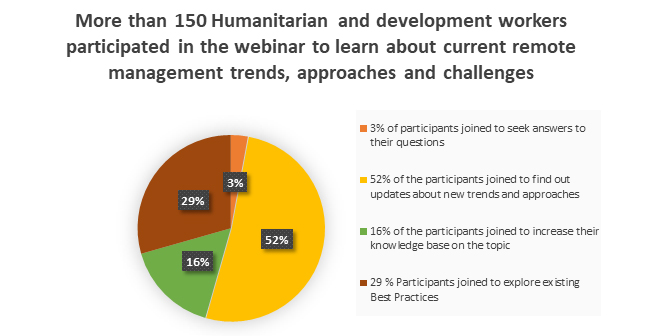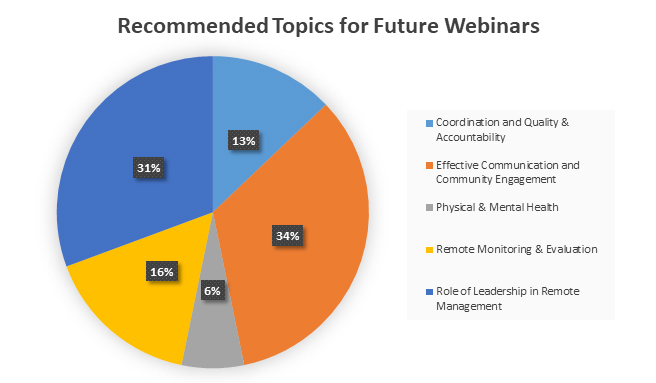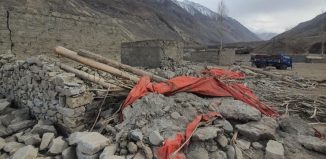Exploring Effective Remote Management Practices
Following the first webinar on remote management practices and the role of Human Resources, this second webinar was targeted for managers on their role in effective remote management.
The webinar on Remote Management and the Role of Managers in the context of COVID-19, was organized by Community World Service Asia and Act Church of Sweden on May 14th and delivered by Uma Narayanan, an independent HR and OD Consultant.

Remote Management: a set of adapted procedures in COVID-19
The webinar discussed Commitment 8 of the Core Humanitarian Standards on Staff Competency where staff are supported to do their job effectively and are treated fairly and equitably. As increasing numbers of people are required to work at home, organizations must adjust and perform all functions and manage staff remotely. In this case, it is critical to maintain staff morale, ensure work-life balance is maintained, a positive attitude toward all staff is adopted and they are trusted to manage their workloads. Managers have a crucial leadership role to play here.
The webinar also presented some of the work force trends seen globally. According to International Labor Organization (ILO), 2.7 billion workers are affected by the Covid-19 pandemic. It is also anticipated that the working hours will reduce in the second quarter of 2020. Some sectors see a catastrophic loss and there is increasing job insecurity amongst workers in various sectors. Mental health of staff is a big concern globally. This is reaffirmed by some of the webinar participants who stated that staff are highly concerned about their jobs. Disruption to on-going programmes are causing a lot of pressure to the managers, who are answerable to donors.
Participants further cited the following challenges managers face while remotely managing diverse staff spread over various locations:
- It is difficult to evaluate employee working hours and generate workload analysis for HR teams
- Transparency and accountability to communities has become largely dependent on Internet connectivity which is not always consistent
- Ensuring the safety of staff from violence and abuse is a challenge for managers
- Remote management requires increased guidance and clearer communication on concepts and procedures to staff which increases the time managers spend on coordination
- SMEs[1] and indigenous organizations need to invest more in technology and skilled HR but do not have the funds to make such investments
- The same work from home policies cannot be applied to staff working in different contexts and in different situations
- Remote management for support functions such as Administration and Finance teams is quite difficult. Programme staff is easier to manage and can occupy themselves with many tasks such as reporting and monitoring.
Steps to increase effectiveness of Remote Management
Primarily, the managers need to set clear goals and ensure there is a direction for their team. Managers should practice being a VUCA leader.
As a leader, the VUCA Model approach is effective in improving and enhancing managers’ abilities to cope with the current pandemic. The VUCA environment is composed of volatility, uncertainty, complexity and ambiguity, all of which we are facing in the COVID-19 pandemic. An effective leader will counter volatility with a vision, uncertainty with understanding, address complexity with clarity and manage ambiguity with agility.
A few participants while acknowledging the VUCA model highlighted the lack of vision in their organization and lack of leadership support in technology.
Reflections:
Participants were encouraged to share some of the best practices they have adopted to improve staff management and organizational productivity during the crisis.
- Managers can distribute workloads efficiently, providing equal growth opportunities to staff and ensure all staff have the same amount of work and no staff feels under worked or redundant in this situation
- There should be SOPs and channels in place for preventive measures and prompt responses from managers whose teams are working in high-risk zones
- Developing situation and crisis specific policies for effective staff management has become a priority
- Remote delegation requires a lot of remote support and capacity building for staff
- Media personnel are among the high-risk group of people as reporters have to travel continuously to gather news and capture moments in public places, hospitals, isolation wards or hold press briefings in small crowds

[1]Small and Medium Enterprises







